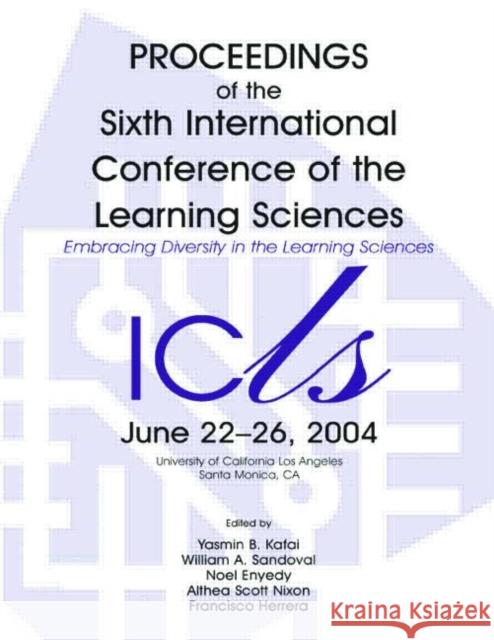Embracing Diversity in the Learning Sciences: Proceedings of the Sixth International Conference of the Learning Sciences » książka
Embracing Diversity in the Learning Sciences: Proceedings of the Sixth International Conference of the Learning Sciences
ISBN-13: 9780805853018 / Angielski / Miękka / 2004 / 256 str.
Embracing Diversity in the Learning Sciences: Proceedings of the Sixth International Conference of the Learning Sciences
ISBN-13: 9780805853018 / Angielski / Miękka / 2004 / 256 str.
(netto: 806,31 VAT: 5%)
Najniższa cena z 30 dni: 844,88
ok. 22 dni roboczych
Dostawa w 2026 r.
Darmowa dostawa!
More than a decade has passed since the First International Conference of the Learning Sciences (ICLS) was held at Northwestern University in 1991. The conference has now become an established place for researchers to gather. The 2004 meeting is the first under the official sponsorship of the International Society of the Learning Sciences (ISLS). The theme of this conference is "Embracing Diversity in the Learning Sciences." As a field, the learning sciences have always drawn from a diverse set of disciplines to study learning in an array of settings. Psychology, cognitive science, anthropology, and artificial intelligence have all contributed to the development of methodologies to study learning in schools, museums, and organizations. As the field grows, however, it increasingly recognizes the challenges to studying and changing learning environments across levels in complex social systems. This demands attention to new kinds of diversity in who, what, and how we study; and to the issues raised to develop coherent accounts of how learning occurs. Ranging from schools to families, and across all levels of formal schooling from pre-school through higher education, this ideology can be supported in a multitude of social contexts. The papers in these conference proceedings respond to the call.
More than a decade has passed since the First International Conference of the Learning Sciences (ICLS) was held at Northwestern University in 1991. The conference has now become an established place for researchers to gather. The 2004 meeting is the first under the official sponsorship of the International Society of the Learning Sciences (ISLS). The theme of this conference is "Embracing Diversity in the Learning Sciences." As a field, the learning sciences have always drawn from a diverse set of disciplines to study learning in an array of settings. Psychology, cognitive science, anthropology, and artificial intelligence have all contributed to the development of methodologies to study learning in schools, museums, and organizations. As the field grows, however, it increasingly recognizes the challenges to studying and changing learning environments across levels in complex social systems. This demands attention to new kinds of diversity in who, what, and how we study; and to the issues raised to develop coherent accounts of how learning occurs. Ranging from schools to families, and across all levels of formal schooling from pre-school through higher education, this ideology can be supported in a multitude of social contexts. The papers in these conference proceedings respond to the call.











